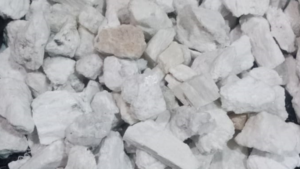Lithium Ore

Lithium ore refers to naturally occurring minerals with significant amounts of lithium, a chemical element with the symbol Li and atomic number 3. Lithium is a light and highly reactive metal with various industrial and commercial applications, including rechargeable batteries for devices such as smartphones, laptops, electric vehicles, and renewable energy storage systems.
Several types of lithium-bearing minerals can be considered lithium ores, including Spodumene. Nigeria’s most common lithium ores are spodumene, lepidolite, and petalite. Spodumene is a lithium aluminum silicate and is the primary source of lithium production.
Due to the increasing use of lithium in the context of the growth of electric vehicles in the renewable energy sector, the situation and development of the source of lithium ore have attracted significant attention to ensure that it provides these stable technologies.
Lithium ore is a mineral product that contains enough lithium to make its extraction economically viable.
According to Investing News Network, the future of lithium is bright; demand for the metal for use in batteries is expected to rise in the coming decades and the stock remains at a historically high level, and experts predict that demand will pass in the future.
Global Market Intelligence predicts significant growth in lithium supply through 2025. New mines, brine pools, and increased production from many existing projects are expected to push global lithium production and more than 1.5 million tons in lithium carbonate equivalent (LCE).
Why buy Lithium ore from Commodity 1?
While Chile (52.9%) And Australia (21.5%) produce the bulk of lithium ore supply, Nigeria’s estimated reserves of untapped lithium ore are 11 million tons. This makes Nigeria the 10th largest lithium-reserves holder in the world. The lithium reserves are found in Nasarawa, Kwara, and Kogi. The exploration and mining of lithium in Nigeria is still in its early stages. According to The Conversation Africa, high-grade lithium has been discovered in Nigeria, where the Geological Agency describes high-quality lithium as containing between 1% and 13% oxide.
Commodity 1 provides Lithium ore directly from the mine site to the global market. There are no middlemen involved, only our staff on the ground. We strive to organize smooth and transparent transactions. We believe in building long-term relationships with our customers. We aim to be our customers’ lithium ore supplier. We offer the best prices for our buyers.
Chemical composition analysis of Lithium ore
| Ingredient | Percentage |
| Lithium oxide (Li2O) | 8% |
| Alumina (Al2O3) | 27% |
| Silicon dioxide (SiO2) | 64% |
| Other minerals | <1% |
Lithium ore composition varies slightly based on the source and what region of Nigeria it is collected. We encourage buyers to ask for a free sample for their composition analysis and evaluation of ready-to-ship material. Samples are free but buyers should arrange with a courier service of their choice to pick up a free sample.
Packaging & Delivery
| Packaging Details: | LUMS/Chips | |
| Port: | Lagos Apapa Port, Nigeria | |
| Bags: | 50 kg | |
| Container: | 20 ft | |
| Lead time: | ||
| Quantity (metric tons) | 20 MT/Month | 60MT/Month |
| Lithium time (days) | 30 Days | 30 Days |
Physical characteristics of Lithium ore:
| Characteristic | Value |
| Color | White, colorless, pink, purple, green |
| Luster | Pearly, vitreous |
| Hardness | 6-7 on the Mohs scale |
| Density | 2.5-3.0 g/cm3 |
| Solubility | Soluble in water |
Chemical properties of Lithium ore:
| Property | Value |
| Chemical formula | Li2O |
| Atomic number | 3 |
| Atomic mass | 6.941 g/mol |
| State at room temperature | Solid |
| Melting point | 180.54 °C (356.97 °F) |
| Boiling point | 1342 °C (2448 °F) |
| Density | 0.534 g/cm3 |
| Electronegativity | 0.98 |
| Oxidation state | 1 |
| Reactivity | Highly reactive |
Industrial Uses of Lithium:
| Application | Description | ||
| Batteries | Lithium is used in various batteries, including lithium-ion and lithium-polymer batteries. These batteries are used in multiple devices, including laptops, cell phones, and electric vehicles. | ||
| Glass | Lithium is added to glass to make it stronger and more heat-resistant. It is also used to produce lithium-based glasses that are used in fiber optics and other optical applications. | ||
| Ceramics | Lithium is added to ceramics to make them stronger and more chemical-resistant. It is also used to produce lithium-based ceramics used in various applications, including spark plugs and medical implants. | ||
| Pharmaceuticals | Lithium is used to treat bipolar disorder and other mental health conditions. It also treats other conditions, such as arthritis and gout. | ||
| Lubricants | Lithium is used in the production of lithium grease, a high-performance lubricant used in various applications, including aerospace and automotive industries. | ||
| Other | Lithium is also used in various other applications, such as welding, metal casting, and water treatment. | ||
CONTACT US
For information: info@commodity1.com
For sales: sales@commodity1.com

COMMODITY 1 CORPORATION
867 Boylston Street, 5 TH Floor
Boston, MA 02116 USA
For information: info@commodity1.com
For sales: sales@commodity1.com
CALL US : +1 (617) 224- 7119
COMMODITY 1 CORPORATION
